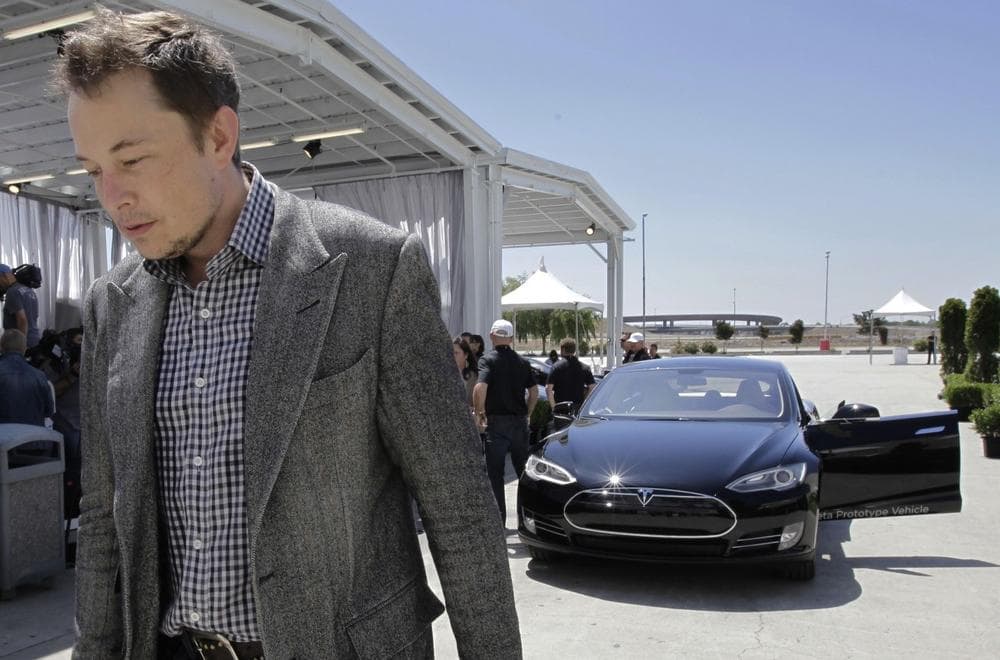Advertisement
The Tesla Tug-Of-War
With a price tag that starts at nearly $70,000, I’m not going to buy a Tesla Model S any time soon, and chances are, neither are you. But if all-electric cars, and variants such as plug-in hybrids, become as common on the road as traffic lights, it will be because of Tesla. The Model S is an electric car that’s turning heads, and changing minds.
Massachusetts, with its embrace of advanced energy and track record of technology leadership, will no doubt be a part of this. Just last month, the Bay State joined with seven other states in a pledge to put 3.3 million zero-emission cars on the road by 2025. But Massachusetts will be on the wrong side of the automotive technology curve if the Tesla gets “banned in Boston,” as a bill filed in the state Legislature would do.
Massachusetts will be on the wrong side of the automotive technology curve if the Tesla gets “banned in Boston,” as a bill filed in the state Legislature would do.
Every once in a while, a product comes along that breaks a mold, and captures the imagination. In recent years, they’ve mostly come with a lower-case “i” in front of their names — iPod, iPhone, iPad. These products — all of them from Apple — combined new functionality with elegance in design. They entered the marketplace at high price points, then came down in price as they continued to improve in functionality, even as they inspired competitors to introduce their own variants.
The Model S is the iPad of the automotive world. And it is developing a cult following that extends beyond its high-end ownership. The Model S was named Car of the Year by Motor Trend and Automobile magazines. “It’s the performance that won us over,” said Automobile editor-in-chief Jean Jennings. “The crazy speed builds silently and then pulls back the edges of your face. It had all of us endangering our licenses.”
The Model S received the highest road-test rating ever given by Consumer Reports. In independent crash tests, the car not only received the highest rating, it did so in every subcategory tested, including roof-crushing, where the testing machine malfunctioned before the car did. Though projected to sell just 21,000 vehicles this year, Tesla’s Model S has already become the third highest-selling performance car in California, and, according to Wall Street Journal’s MarketWatch, one of the top five sellers in the nation’s 25 richest neighborhoods.
Credit founder and chairman Elon Musk’s not-so-secret “secret master plan,” which begins with building an “electric car without compromises.”

“Almost any new technology initially has high unit cost before it can be optimized and this is no less true for electric cars,” wrote Musk on the Tesla website. “The strategy of Tesla is to enter at the high end of the market, where customers are prepared to pay a premium, and then drive down market as fast as possible to higher unit volume and lower prices with each successive model.”
Musk has also stated that he plans to introduce a smaller sedan in three to four years, with a price point in the mid-$30,000 range. This approach mirrors the way other new technologies have penetrated the marketplace — from the high-end down.
“The original IBM PC, using an operating system developed by a little-known company called Microsoft, sold for $1,565 in 1982 — over $4,400 in today’s dollars,” observed Boston Globe columnist Tom Keane after his own Model S test drive. “That price was also ridiculously high. But the potential of that technology launched a revolution, one that eventually made computers affordable to almost everyone.”
Still, Musk cannot rely upon local car dealers, who would just as soon sell well-heeled customers a Cadillac or Lexus, to market his visionary vehicle. Instead, Tesla has broken with tradition by selling directly to consumers through company-owned showrooms located in markets (like the Boston area) where there are likely early adopters. This is akin to being able to learn about and shop for the latest Apple innovation at an Apple store, as opposed to Best Buy.
To ban the Tesla showroom would be to banish the most revolutionary car in the country from the Massachusetts market, just to protect a monopolistic sales system that services established car manufacturers but thwarts upstarts like Tesla.
This has earned Tesla the wrath of the National Auto Dealers Association and their state counterparts, and put the company into state-by-state combat with the local dealer monopoly on car sales. In Massachusetts, Tesla won in court, but is threatened by a bill introduced in the state Senate that would strengthen the dealer monopoly — and shut down Tesla’s operations in the state, including the existing showroom, and prevent the company from opening its own stores anywhere in the commonwealth. A State House hearing is scheduled for Nov, 19.
In truth, the number of Teslas getting sold out of the Natick Mall is no threat to the dealerships that line the Automile. But to ban the Tesla showroom would be to banish the most revolutionary car in the country from the Massachusetts market, just to protect a monopolistic sales system that services established car manufacturers but thwarts upstarts like Tesla. A move like this would be out of step in a state that prides itself on its “innovation economy,” ranging from high tech to biotech to clean energy.
Americans love their cars, and American car lovers love the Tesla Model S. That bodes well for the future of clean, efficient, high-performance cars that people in Massachusetts would want to drive — if we let them.
Related:
This program aired on November 14, 2013. The audio for this program is not available.